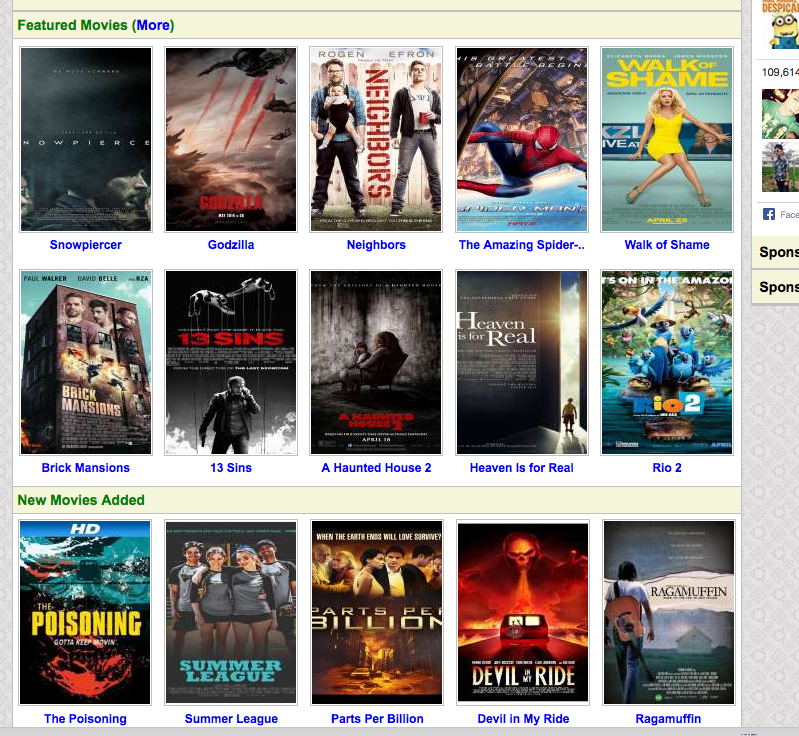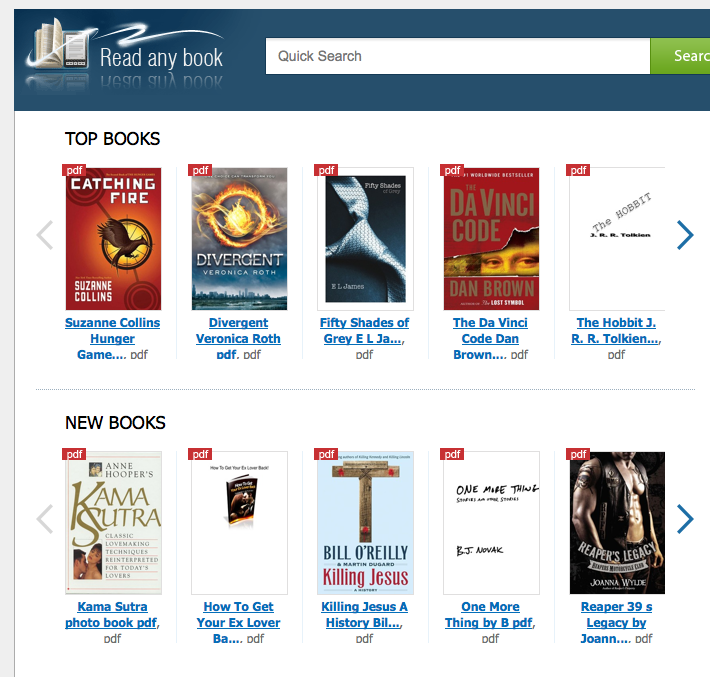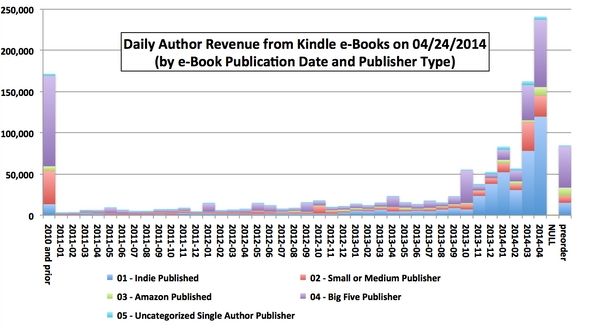I recently discovered something that is pretty eye-opening about the state of media today, and into the future. Perhaps I’m late to the game, but I’ve found it pretty amazing. Basically, it’s possible to watch any movie you want for free. I’m not going to link to it because it’s illegal, or at least ethically dubious, but sites like this look like this:

I found it via Twitter. Netflix was trending one day and someone tweeted, “Why is everyone using Netflix when you can just use _____.” The answer is: I don’t know. If you’ve ever dealt with Netflix or Amazon Prime, you’ve probably gotten annoyed with the limited number of new releases, or good releases in general. Sites like the above….solve that. Once people figure this out – which is inevitable – Netflix is doomed. This isn’t Bittorrent which requires a Bittorrent client and some amount of know-how, this is like getting a better version of Netflix for free.
Spotify has already killed the music industry, even if it’s the most amazing thing known to music-loving mankind. Basically, get every record in history for $10 a month. Why anyone buys a CD, which costs more per record than Spotify costs a month, I have no idea. What isn’t there (the Beatles), just head to Youtube Full Album and you’ll more than likely find it there. Oh, and you can use a free client to download Youtube videos.
And now I’ve discovered the equivalent site for books. Again, not linking it, but it looks like this:

The days of making a profit off of being an artist are going to come to a close very soon. I realize I’m facilitating this by letting people know about these services, but the age of free isn’t coming. It’s already here.
Which means art is going to become a lot more discardable. If everything’s free than people are going to have less patience with any new media. If you’ve bought something, you’ll maybe stick with it. If it’s free and there are 1000 other free things to choose from, reading/listening/viewing habits are going to change.
The End of the Novel
The habits of writing are probably going to change as well. If there’s such a massive amount of competition, it makes sense, then, to have 40 books out than 4. That means fast writing over thorough writing. We’ve spent a lot of time here imploring writers to hire an editor. It’s no doubt important. But everyone reading this in 2014 was raised in the age of hardcopy, not the age of internet browsing. How many people read a blog post and think, “That person should have hired an editor”? There’s a looseness to blogging that makes it what it is – a digital journal, not a professional document.
Books are about to follow the same path. Right now people still venerate books as a sort of holy object. But that’s because we were raised on books. How holy do you consider a paper newspaper at this point? Or does it seem cumbersome and outdated? Of course, there’s a pleasure in reading a paper book that you can’t (currently) get from reading an ebook, but that’s partly because it’s familiar. People are going to read more and more on their phones – and treat books the way they treat blogs, i.e. as free, discardable content.
Will Self is right. In The Death of the Novel (yes, another one of these), he writes:
There is one question alone that you must ask yourself in order to establish whether the serious novel will still retain cultural primacy and centrality in another 20 years. This is the question: if you accept that by then the vast majority of text will be read in digital form on devices linked to the web, do you also believe that those readers will voluntarily choose to disable that connectivity? If your answer to this is no, then the death of the novel is sealed out of your own mouth.
This is only excarbated by the fact that books are free. It’s not just that people are plugged into social media, it’s that the entire framework of content delivery puts a different value on art.
Art Should be Free
In a strange way, this is how it should be. Art should be free. There should be no barrier for everyone either publishing OR reading books. Unfortunately, the fallout from this is writers making no money. Just because Hugh Howey’s a millionaire today means little to everyone else. All it means is that it’s possible – it’s also possible to become the next Stephen King. It may seem easier because Hugh Howey did it from his living room, but he’s 1 of a handful of truly rich self-publishers.
But what about Author Earnings? Charts like this are absolutely amazing:

I hate to be this cynical, right when everyone’s getting excited, but Author Earnings is just outlining the new system, not proving that everyone can be Amanda Hocking. The new system is one where certain self-publishers make a living, and many others don’t. In other words, it’s not any different than the current system – or, rather, the traditional system when publishers were more liberal with high advances. Now advances have been replaced for many writers by self-publishing. Self-publishing is entirely viable and makes a lot of sense for a huge swath of genre writers. But it is no guarantee of making money, any more than it’s a guarantee to be picked up by a traditional publisher. Eventually the self vs. trad debate is going to be history – of course writers self-publish when there’s money to be made – just every writer isn’t going to get a piece of that pot. This (flawed) post makes a similar point – Self-publishing is not revolutionary – it’s reactionary:
Unfortunately, self-publishing is neither radical nor liberating. And, as revolutions go, it is rather short on revolutionaries. It is actually reactionary, a contracted version of the traditional publishing model in which companies, who produce for a wide range of tastes and preferences, are replaced by individual producers each catering to very narrow range.
For one thing, traditional publishers aren’t as varied as they should be, and that’s the problem. However, with all the cheerleading about self-published book sales, what people are cheering is a very narrow field of actual titles. This anecdotal evidence from The Passive Voice is nice, but when there are 400,000 self-published titles coming out a year, 1000 money-makers isn’t great odds.
This is the story no one wants to hear. As a self-publishing advocate, the emphasis is supposed to be about how self-publishing is a corporation killer and giving power to the people. It is, but overall the power is self-expression, not monetary. Put another way, it’s like blogging on a free service – some people have made money out of their blogs, most don’t.
This is the Pandora’s Box opened up by self-publishing and the internet. With so many thousands of books published on a daily basis, and more books than you could ever read going for free, it’s more than a little hard to make a dent. So what’s the answer – why even bring this up? Because it’s a reality, the same reality that musicians are facing today. iPods are two decades old, ereaders just got here, so the same thing is bound to happen to writers as well. This isn’t wild pessimism, as much as it may be pretty depressing, but it is the reality of the coming marketplace.
It can also be liberating. When there’s less possibility of selling books, there’s less pressure to. So if your book is currently not doing very well, it may not entirely be your fault (it may actually be because you wrote a bad book, but it’s not a given). Selling books is hard, as it ever was. It was hard 30 years ago when there were gatekeepers and fewer books published. It’s exponentially harder now that there’s a billion words published every day. Writers are now competing with music, games, TV/movies, social networks, texting, all on the same device.
So don’t worry about selling books, worry about writing them. The world will always need books – the more the better. The more good books the better too, so skimping on editing doesn’t make sense, even if reading habits might change. Just don’t think it’s a given to sell a lot of books, and don’t compare your sales with anyone else’s. Really, art should never be about making money – the internet is making sure that’s the case.
Get an Editorial Review | Get Amazon Sales & Reviews | Get Edited | Publish Your Book | Enter the SPR Book Awards | Other Marketing Services






















“Unfortunately, the fallout from this is writers making no money.”
And it’s a BIG fallout. If artists make no money at all they’ll stop creating, at least the great ones. Not because they are selfish, but because day jobs. Day jobs are tolerable and people are able to make time to create even when they still have day jobs because someday they’ll make it big time. Or not, but at least there’s this indiscernible unconscious voice that tell them this. Without it, day jobs and quite mediocrity will ensue.
I think the uproar over independent publishing and the “death of the book” is overwrought, as is often the case when an industry experiences significant change.
I am a self-published author. And I will say that as far as sales go my book is doing well, above average even, but I am nowhere near achieving Hugh Howey-type sales results. I may never get there and that’s OK. I have readers today that I didn’t five years ago when my query letters and unsolicited manuscript submissions were promptly rejected by every mainstream publisher and agent I submitted to.
I can’t live off of my sales currently, but I am fine with writing more novels, getting better at it, and building a readership over time.
But I read so many articles and blog posts bemoaning the fact that very few authors will make a living by self-publishing books.
So what?
That is no different than any time in publishing history before the modern availability of ebook publishing.
And it’s been the same in all of the arts, be it music, graphic arts, acting and literature. I am a musician also, and when I was younger my band self-funded two demo tapes (yes, as in cassette tapes – pre-internet too) in the hopes of getting signed to a record deal. Didn’t happen, but so what?
We all know that publishing companies make their money on a handful of authors. Most of the books published every year through traditional means lose money.
Self-published authors have an advantage in that there is little to no overhead costs and no barrier to entry. But just like traditionally published authors, most self-published authors will never, ever sell enough books to make writing their career.
Again I ask, so what?
The fact is we can publish at will. We can strive for sales success. And we can relish in the opportunity to write and publish when only a few years ago most of today’s self-published books would never have seen the light of day.
Most articles I see about self-publishing talk about how much money people are making. It’s the entire impetus behind Author Earnings and JA Konrath’s posts. It sets an unrealistic standard, I think, so that’s what I was getting at. People keep using $ to prove that self-publishing’s viable, and to me that’s a fraction of what makes self-publishing important.
There are also a lot of articles out there about people making tons of money selling Herbalife or Amway, when most people won’t. Articles about big money in self-publishing are sort of the same thing.
The only one who really suffers is the “traditional” publishing industry, since editors, agents, bookstores and publishing houses are becoming obsolete. And I could care less. Instead of pushing really good work, you’re the ones who set the bar ridiculously low, championing dog crap like Fifty Shades of Grey and Twilight. Good riddance to you, and at long last, individual artists will have the opportunity to make a name for themselves through their own hard work, regardless of whether the publishing elite “lets them.”
This is a solid article that raises some good points.
Henry’s statement in the comments about the results of the minority setting unrealistic standards is spot on as well. In fact, what once passed as a decent long form blog post is now being packaged up and sold as a book in Kindle so it’s hard to see exactly where the self-publishing industry is heading with this sort of low-quality fare slipping through the net on a consistent basis.
Oh and thanks for linking to the “Self-publishing is not revolutionary……” article. I hadn’t spotted that one but I shall give it a read now. Seems quite provocative!